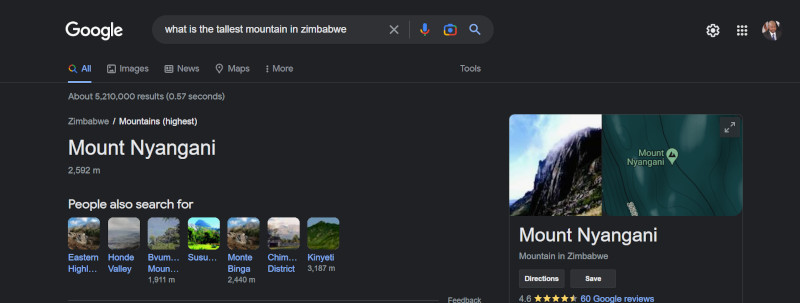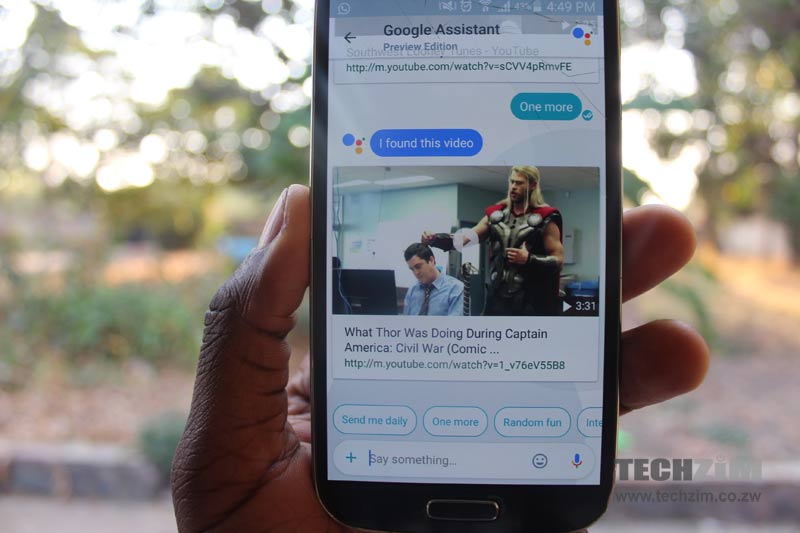Lately, all the buzz is about how AI services like ChatGPT and Bard will change how we use the internet. This is how we are doing it right now, we go to the search bar, type in what we want to know and hit enter. It’s simple enough.
Google, which over 90% of us are using, spits out a list of websites that address that topic and you get to click on them one by one until you find what you’re looking for. Hardly do we even have to visit the second page of search results. It works well enough.
ChatGPT and these new AI chatbots are trying to make that whole process a bit more interactive. They want to make it all feel like a conversation, more like you’re chatting with a very knowledgeable human. That is interesting for a few reasons.
These chatbots pull information from top websites for those particular search terms. They then just tell the searcher what the answer is. We are used to this when we ask for stuff like ‘what is the tallest mountain in Zimbabwe’ and Google tells us plainly that it’s Mount Nyangani at 2.592m.

Notice how you don’t have to click on any link. You just get the answer, which Google is pulling from Mt Nyangani’s Wikipedia page. Now, for a question like that, you hardly ever need more information on the matter. Your curiosity has been quenched and you move on to the next thing.
So, in all this, Google has served you well but Wikipedia has missed out on a user. You might not even have bothered to check where Google sourced that information. This is going to be the case for almost every search result when using services like ChatGPT.
The death of the blog/website
Google and ChatGPT do not actually know the answers to the questions we ask them. They just search the internet for the answer on the websites accessible to them and serve it to us. ChatGPT can generate original content but it needs a lot of information to be out there from which to train itself.
Most of these websites they pull from or train themselves on are commercial enterprises that rely on getting eyeballs on their websites. You know the business model, you visit a website and scroll through the content and as you do that they serve you a few ads so they can get paid themselves.
Now, if Google or ChatGPT scour through that website and serve the answer to the searcher in plain text, then the searcher does not even need to visit the website. You can see the problem, right? With no eyeballs going to the website, the website loses out on ad revenue. Tough luck, you say.
Well, we could look at it as the world moving on from that particular way of doing things and tell websites to move with the times. However, let us remind ourselves that Google does not have a bank of this information, they rely on those same websites.
A terrible search experience
So, with dwindling revenues, these websites will have to close shop and where will Google get the information, pray tell? The search experience will deteriorate as more and more websites close shop.
I am not going to sit here and pretend it is not a better experience to just get your search result in plain text without having to click on any link. However, the more this happens, the more the websites that are actually collecting and sharing this information stop doing that. Then the result is a worse experience for everyone involved.
That is one potential downside to the search revolution that AI is promising. Of course, that’s the worst-case scenario and websites could yet survive. Many have been diversifying their revenue streams over the years. Meaning they could yet afford to keep the websites running, counting on those other revenue streams.
Paywalls
However, the problem with websites having these other revenue streams is that many are just going to paywall their stuff. That’s well and good for them but as we know, a paywall will exclude many from partaking.
This means the more that ‘trustworthy’ websites hide their content behind paywalls the worse the search experience gets for most people. Very few will pay for those subscriptions and so they will be left to get their information from ‘untrustworthy’ sites.
It’s not only searchers that would be getting free information mostly from ‘untrustworthy’ sites, it will be Google, ChatGPT and friends. So, the mostly free internet we are used to today would collapse.
ChatGPT and Google as gatekeepers
The answer could be for Google, ChatGPT and friends to pay websites every time they pull their answers from those websites. That way the websites are incentivised to keep producing the content from which the search engines pull answers.
That would have its own problems. For one, how would ChatGPT be able to pay for this information? What is their own revenue model? They have premium subscriptions of their own where they will hide some of that information.
Maybe not hide, but they will prioritise those that pay and we find ourselves back at ‘those who pay will get the best experience.’ Which is not really how search has been in all these years.
I’m thinking out around here but I hope the points I’m trying to make are clear. We are in for a change in the way we use the internet for sure. It’s just that we don’t know what the new way is going to look like. It might be a worse experience if we’re not careful.
We shall see how this all pans out in due time. We’re in for a show, whichever way it goes. Do let us know what you think about all this in the comments section below. You must have thoughts on this.
Also read:
Google embarrasses self trying to show their AI can compete against ChatGPT

What’s your take?